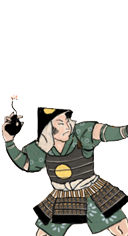
Basic Unit Statistics (can be modified by difficulty level, arts, skills, traits and retainers)
| Recruitment Cost | 600 | |
| Upkeep Cost | 150 | |
| Melee Attack | 2 | 5% |
| Charge Bonus | 2 | 4% |
| Bonus vs Cavalry | 0 | 0% |
| Range | 50 | 7% |
| Accuracy | 30 | 30% |
| Reloading Skill | 15 | 15% |
| Ammunition | 10 | 12% |
| Melee Defence | 2 | 5% |
| Armour | 2 | 13% |
| Morale | 5 | 10% |
Strengths & Weaknesses
- Devastating but short range attack.
- Very vulnerable in melee.
- Very vulnerable to missiles.
- Vulnerable to cavalry.
Description
It takes a brave man to swing an explosive around on a rope! These men honour their lord by hurling dangerous loads of fire at the enemy!
Fire bombs are made from earthenware horoku pots that are filled with gunpowder and then lit by a fuse. As the fuse burns down, the thrower swings the bomb by an attached rope and then releases it at the right moment, hopefully hurling it at the enemy to explode. The resulting blast can be terrible as the pot shatters, and has a damaging effect on enemy morale too. These grenades can be used against enemy walls in sieges, but are just as effective when used as fire support in a field battle. These men are not experts in close combat, and need protecting from the enemy. They do not have the numbers to survive for long in melee. Japan's first introduction to gunpowder happened during the Mongol invasion of 1274. At this time, the samurai were still fighting according to strict tradition: they would find a worthy opponent, declare their notable heritage and achievements, and then begin a set of single combats. The Mongols, however, fought very differently, and when the samurai met them at Hakata Bay, they were greeted with a barrage of dishonourable but effective explosive bombs. Despite this initial experience of gunpowder's usefulness and effects, the samurai would not properly adopt it for another 300 years.